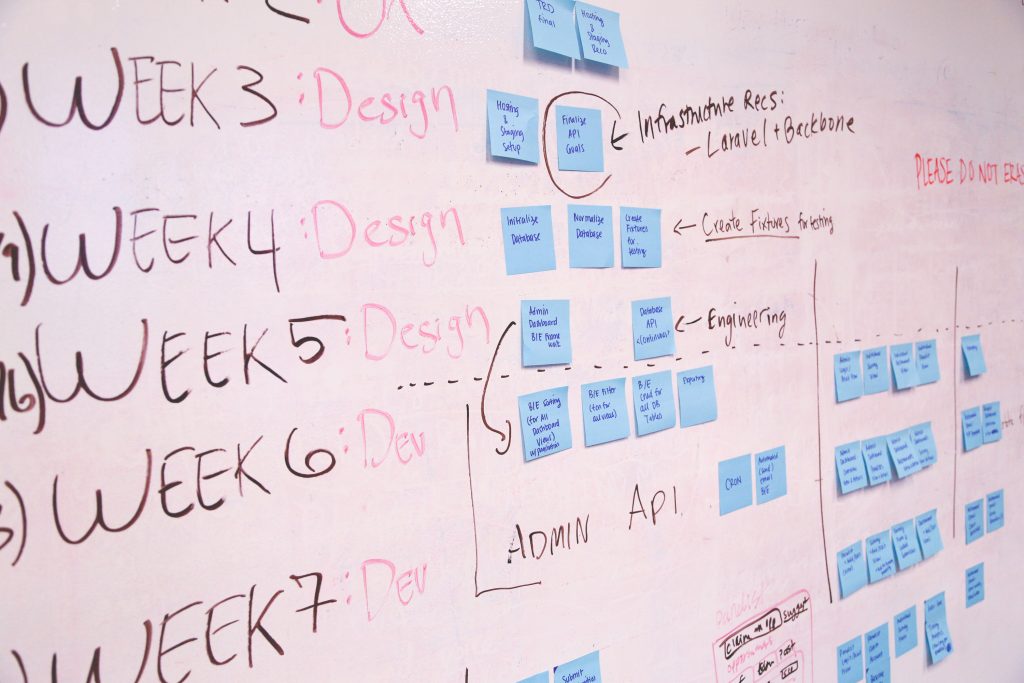
Do you often get stuck in ruts or have a hard time making decisions? Perhaps you get into analysis paralysis more often than you intend, or maybe you go through everyday motions without feeling like you’re moving forward? This is how you can get stuck in an unhealthy relationship for years, or work in a job for a decade before finally realizing you hated it all the time.
When a decision-making process is in the auxiliary, or what we like to call the Co-pilot position (Car Model), it takes conscious effort to engage it. Therefore, making a move can take forever and sometimes opportunities get missed because it does not come to us as naturally as our primary function, or Driver position. In this article, I want to talk about each of the decision-making (judging, not perceiving) processes and how they look when in the Co-pilot- or growth- position. These functions are Authenticity, Harmony, Accuracy and Effectiveness. Since I’m an INTJ, it’s only natural that I start this series with my own Co-pilot, Effectiveness.
The technical name for “Effectiveness ” is Extraverted Thinking, and it values sustainable systems, milestones and measurable information. In other words, it’s the ‘get shit done’ process. It gets things checked off the to-do list and makes sure you are meeting your goals. Since it’s in the Co-pilot position for both INTJs and ISTJs, it is a source of growth for us.
A Pitfall:
It seems easy to just leave it at that, right? Go do stuff! The thing is, there’s another process intertwined with it that can bring help or harm. This process is “Introverted Feeling,” or what we’ve nicknamed  “Authenticity.” This process is all about what feels right for us, what’s ethical, and what feelings are showing up. Every Effectiveness Co-pilot is always coupled with Authenticity in the 10 Year Old position. This means that we can sometimes get stuck in our feelings. The worst part is that, sometimes, that stuckness can pull us away from our Effectiveness process. It’s a constant push and pull, like the sea, and getting into our Co-pilot helps us bring in the tide. While Authenticity can feel nice and soothing at times, less nourishing water is available to us and there’s a risk of drought.
“Authenticity.” This process is all about what feels right for us, what’s ethical, and what feelings are showing up. Every Effectiveness Co-pilot is always coupled with Authenticity in the 10 Year Old position. This means that we can sometimes get stuck in our feelings. The worst part is that, sometimes, that stuckness can pull us away from our Effectiveness process. It’s a constant push and pull, like the sea, and getting into our Co-pilot helps us bring in the tide. While Authenticity can feel nice and soothing at times, less nourishing water is available to us and there’s a risk of drought.
Develop Your Co-Pilot:
So how exactly can we get into our Effectiveness process? I often hear others ask this question and people come up with very simple, straightforward answers. “Buy a daily planner! My ISTJ friend relies on it!” Or “My INTJ husband uses a color-coding system!”
Do you think this is all there is to the Effectiveness process?
I say the root of the problem is not being addressed. We need to ask WHY it’s difficult to get into our growth state. The answer lies in our tertiary, Authenticity.
What we need to do is not just go for socially-approved, arbitrary means of planning or what others think Effectiveness is. We need to do what feels right for us. Feed the 10 Year Old so they stop complaining, and then you can go do your business.
This means that you need to create the right system for you. What milestones do you think in naturally? Do you actually care if you start something by 9:30am? Are there particular events you prioritize? What things are most meaningful to you? What are the things you wish to do before you end up on your deathbed? What is the right path in the long run?
These are the questions you’ll need to answer before you can form your own authentically personal system. When it’s totally right for you, it will be sustainable.
And hey, maybe a daily planner DOES work for you. Maybe it doesn’t. That doesn’t make you any less INTJ or ISTJ. It means that you know what works for you and that’s a good thing.
I suggest doing some research. Try different organization techniques. Consult the people around you and see if they have ideas you hadn’t considered. Take in the options and design your own process by piecing methods together or by  making your own from scratch.
making your own from scratch.
If you tap into your Effectiveness process well, you’ll be able to maintain a stable source of energy and you’ll meet the meaningful goals that pertain to your life’s purpose.
When you really know what method works the best for you, you’ll be unstoppable.
Tangible actions:
- Read 7 Habits of Highly Effective People by Stephen Covey. This book is all about building sustainable systems in your life to meet your long-term goals no matter what your circumstances.
- Freewrite on a blank piece of paper. When you organize it, think about how you normally break apart information. Is it by steps? By ideas? By dates? By roles? This is probably the way you need to sort your goals as well.
- Start big and end small. Don’t think of what you’re going to do tomorrow or how you’ll organize your closet. Take those big dreams you have and see how you can break them down into manageable tasks that can be placed on a to-do list. Example: I want to write at least one novel in my life, so I will write 30 minutes everyday on 750words.com. Every Saturday, I’ll take an hour to learn about a particular writing technique to focus on for the following week of writing. Once I hit 50,000 words, then I’ll go into an editing phase for 30 minutes per day.
- Try on different systems for size. See how they fit. Do the daily planner thing and see if it’s right for you. Use blank paper. A graphic organizer. A digital app like Endnote. A whiteboard. Get into short-term relationships (or even casual one-night-stands) with these methods to sense their flavor. And if they mesh well with your own savory hue, then add it to your collection. If it’s a maybe, then perhaps it needs more of your own personal spice. Tweak it to your needs. Use only the necessary bits and pieces for specific occasions.
- Delegate a part of a project you’re currently working on to one of your friends. If you have a blog, invite your friend to write an article and set the parameters around it. This helps you set up a system that others can understand and creates milestones for both you and your team. It can be as small as explaining to your friend what kind of picture you’d like them to take. For example, I basically take a picture of them, show it to them, and say “That’s how I want you to do it. See this angle? And how the light hits?” Or it could be more in-depth like asking someone close to you to research something for you if you haven’t got the time to do it in that moment.
Decisions, Decisions…
Sometimes as tertiary Authenticity users, we can confuse what feels right with what feels good. It’s better to focus on what will be most effective in the long-term so we can make our best decisions.
As an INTJ, I tend to use pro/con lists most often. For example, my most recent relationship ended because I asked myself this: What are the benefits of staying in this particular situation? What positive or negative things would happen if I left? I made a list of each factor and used the 80-20 metric. It ended up looking a bit like this:
Pros
- We communicate well together
- He helps inspire me to be more proactive
- He cares a lot about me and respects me (because feminist men are awesome!)
Cons
- I have become a bit dependent on him.
- I feel too anxious and insecure in this relationship.
- I need more healing to do before getting into a long-term relationship because I don’t have enough to offer at the moment.
- My needs don’t match up with what he’s willing to give.
- This is long-distance and while I’m willing to commit to that, there is no mutual, concrete end-goal to look forward to.
- Our five-year trajectories into the future don’t match up.
- There’s no guarantee that we will be able to be physically together.
- Our communication recently has become too synthetic and in-genuine.
I decided that since about 80% of what I came up with indicated that leaving was best, then so be it. I planned for the breakup, anticipated what emotional turmoil might pop up and took measures to combat these things.
And did you notice that my Authenticity process snuck in a few words?
“I feel too anxious and insecure in this relationship.” Imagine if I didn’t bother making this list! What if the pros actually outweighed the cons and I totally made a drastic decision based on my insecurity! If I broke up with this guy in that way, I would have never known what could be and would spend the rest of my life second-guessing.
But because I was able to lay all of the elements on the table, I made an objective decision and will remember the reason why we broke up for the rest of my life. I sent him an email detailing these things and it was a calm endeavor. We still talk occasionally and there are no hard feelings because I was able to communicate my reasoning for wanting to part ways. We were able to talk it through and make a mutual decision about it.
If 80% of my list had more pros, I would’ve planned for the problem-solving. Maybe we would need therapy or a fresh perspective on things. Maybe I needed to do some changing and it was me who needed to open up and be more available to my partner. Don’t let your feelings get in the way. They can be a good source of guidance to lead you to possible options and solutions, but do not give them permission to make the decisions.
For ISTJs, I suggest being open to new experiences and then analyzing it in retrospect. Maybe there’s a new coworker and you’re concerned that they won’t do a good job. Test it out in real time. Work with them and delegate a few small tasks to see how they handle them. Make sure you keep an open line of communication during this process! Don’t let your feelings control your reactions. Speak up and problem solve. If your co-worker was late or forgot an important file, ask why. Don’t just assume the worst of them because that’s giving your Authenticity process permission to make decisions for you. Get that outside feedback so you can have a clear view of what’s going on. After maybe two weeks, think about what happened as objectively as possible. What kinds of challenges did this coworker face? Were they actually  incompetent as an employee, or are they just getting used to the new job? Were they doing their best to get the tasks done? Did their accomplishments outweigh their mistakes? Just as I mentioned for INTJs, let your Authenticity process guide you to possible conclusions, but do not let it make the final judgement.
incompetent as an employee, or are they just getting used to the new job? Were they doing their best to get the tasks done? Did their accomplishments outweigh their mistakes? Just as I mentioned for INTJs, let your Authenticity process guide you to possible conclusions, but do not let it make the final judgement.
Use any method in your arsenal that you think might work. Try a graphic organizer, consult your friends, write yourself an essay about the situation and try to view things as objectively as possible. What are the facts? Uncover them, list them, weigh them, and then decide.
Final notes:
As you’re deciding on which effective method is best for you, make sure you’re not avoiding certain things just because it feels hard or uncomfortable. It might take you a few tries to really find that sweet spot. Whatever method you choose, it must be flexible. Don’t let the plans run you, and don’t let the emotions call the shots. Effectiveness is all about long-term sustainability. So making sure the activities on your checklist are right for you and the decisions you make thoroughly thought through is an essential part of the process.
Want to learn more?
Discover Your Personal Genius


Share:
Harmony: The Secret Weapon of the INFJ
Patterns and Causes of INFJ Wounding
38 comments
Hi Chelsea,
Thank you for responding. I read through your reply a number of times and again, there’s something that doesn’t add up. You expressed that you were focusing on how to engage Effectiveness, but here’s the thing…. you did that by specifically talking how to deal with Authenticity (section under the header Decisions… Decisions).
Do you see how that could be confusing for someone thinking they are just dealing with Effectiveness when that’s been thrown into the mix?
Antonio mentioned on one of the podcasts (I cant remember which one, I’ll have to dig for it) that the secret to developing the Co-Driver is centered in dealing with the 10 Year Old.
As in it’s the interaction, the dynamic which is where the secret sauce lies.
So, if there’s a focus on making the one better, it renders the point of discussing them individually a bit of a moot point. I mean no offense with this, but that distinction is very important.
Again, nothing wrong with talking about each separately, but discussing performance and personal growth tactics needs to include a discussion on the dynamic between each part. As they do not act in isolation of each other.
Example: The listing of pro’s and con’s doesn’t work for everyone.
There are INTJ’s out there that require a rational path through emotion to make peace with a decision enough to be able to move forwards. That they require the detail to frame the situation, using Perspectives, to see the other side, while buffering against being a sitting duck by having strong boundaries and values within Authenticity to protect them against malicious actions of other people and allow them to act quickly and so be leveraging Effectiveness.
I’m specifically referring to INTJ’s as the N pushes for an internal understanding before action is possible. I recognise that ISTJ’s may not work that way.
(The reply button is missing from your most recent post on June 26th so this response is awkwardly out of order.)
Anna,
I’m not sure why there’s such a misunderstanding here.
“it’s the interaction, the dynamic which is where the secret sauce lies.
So, if there’s a focus on making the one better, it renders the point of discussing them individually a bit of a moot point. I mean no offense with this, but that distinction is very important."
That’s why I acknowledge the importance of Authenticity in this article.
“Example: The listing of pro’s and con’s doesn’t work for everyone. "
I never said that it works for everyone. I only gave a personal example of a system I use.
“There are INTJ’s out there that require a rational path through emotion to make peace with a decision enough to be able to move forwards.”
And I mention using authenticity as a guide to making those decisions. That’s exactly why I mention authenticity in this article. The path is through emotion. The end goal, the decision, is made with Effectiveness.
This conversation has become very detail-oriented which is exhausting for me. I’m not sure why the connection between Authenticity and Effectiveness isn’t clear. If I went into Authenticity more than I thought was needed, this would be a book rather than an article.
Speaking of books, it sounds like you’re really interested in going incredibly deep with the relationship between the cognitive functions. That’s great! For that, I suggest a full length book. Perhaps Lenore Thomson’s “Personality Type: An Owner’s Manual”. There are also in-depth courses here on Personality Hacker that you can take. I haven’t been able to take all of the courses because I don’t have the money, but if you do then feel free! There is a course called “Your Personality: The Owner’s Manual” which I would suspect will get into the Effectiveness/Authenticity dynamic that you wish to pursue more.
Here’s a link to the course: https://ca157.infusionsoft.com/app/storeFront/showProductDetail?productId=42
Otherwise, there’s nothing more I can do to help you understand my reasoning for mentioning Authenticity here. I’ve done all I can. Thanks so much for enjoying the article and I wish you good luck in acquiring more resources in learning about the dynamic between Effectiveness and Authenticity.
Peace,
~Chelsea
Hi Anna!
Thanks for continuing the conversation.
It’s interesting that my wording came off as “please completely disregard your emotions”. I focused more on the Effectiveness process simply because this article is about the Effectiveness process. You’re absolutely right that there is so much more to the Authenticity process and I’m happy you realize this. That’s certainly a sign of emotional intelligence on your part, so congrats on the hard work!
If I went more in depth on the Authenticity process, this article would have been longer than it already was. I wanted to keep it as concise as possible without hindering the sole message. I have some articles planned (some already drafted) that will be out in the coming weeks that focus solely on our Authenticity process and how to change our relationship with them. It’s advice for TJs to appreciate the importance of emotions. I hope you’ll look forward to it.
Thanks again for your input!
~Chelsea
Hi Chelsea,
I’m going to rephrase my question while I can see where your reply is going, but that’s not what I asked. I’m talking about conceptual frameworks that are emotional in nature. As in the mental constructs that determine why and how we respond emotionally to a situation. As Authenticity is about doing what we feel is right, a limitation arises immediately if our ability to understand, name and frame our emotions (and the emotions of other people) is immature. Which further implies that a betterment of the emotional constructs that relates to outlying the analysis, determination and response to an emotion (both within and of another person) is a significantly stronger path towards engaging effectiveness.
I completely disagree with the idea that Authenticity is simply this helpless child that you pat on the head and tell them to go and play outside. While your comment about emotions being an alert system is something I completely agree with, I think you are disregarding the strength and visibility that can be gained from taking the child a little more seriously and training it appropriately.
Put differently, it’s about increasing the emotional intelligence capacity of a person so that they are able to discern why they feel in a particular way and have the right tools to respond. I think ANY advice to tell someone to disregard their emotions is foolish and dangerous. It’s not simply about saying “hey, I see you.” but more about “hey, is everything ok? Tell me about what you are feeling, let’s understand why and do something about it.”
While INTJ’s present as rational creatures, I believe that’s a complete misnomer. No decision is simply and solely rational. Every decision is emotionally derived. The logic comes later. Even in people that are typed as rational. If you aren’t sure what I mean, any book on behavioural economics will outline this further.
Finally, I believe that the path to being ridiculously effective and marrying perspectives in that process, is fundamentally linked to the status and maturity of Authenticity. That without developing a mature and varied emotional toolset, an INTJ will eventually and simply run out of steam or end up feeling empty/despondent and here’s the worst part….
They won’t know why.
Because that takes self awareness and self knowledge.
So, what I’m trying to get at, is that I still don’t agree with your premise. I think it focuses on the wrong problem.
Great question! Usually that’s when I start asking others for advice whether they’re people close to me or strangers on internet forums/Facebook groups.
Otherwise, I would try to frame things into questions and type them up into a search. I’d read other blogs or articles to see what solutions or long-term benefits could come out of the question. If there are more concrete actions available for a particular choice, then I would most likely do that option.
Finally, I make sure my final action of choice is in line with my most important values. Does that help? If not, I’ll try to think of a situation in my life where I didn’t have such a clear 80/20 distinction and can relay that experience to you.
~Chelsea